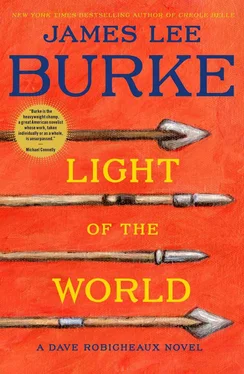Unless she knew him.
There was another troubling issue. To anyone’s knowledge, with the exception of the farmer from whom he possibly stole a truck, Surrette had never attacked a lone male. If Surrette was our man, why would he go after Bill Pepper in the cottage up at Swan Lake, and why would he sexually mutilate him?
I had only one answer: Surrette had planted the bug in Clete’s cabin and learned that Pepper had kidnapped and sexually abused Gretchen Horowitz. He murdered Pepper, knowing there was a good chance Clete or Gretchen would be blamed for his death.
Why go to all this trouble to do injury to Clete and Gretchen, neither of whom had done him any harm? It wasn’t adding up. Also, what was Surrette living on?
Crime is about money, sex, or power. I had a feeling all three were involved with our visitor from the land of the Yellow Brick Road. As I stared down at my legal pad, I realized there was one element missing from all the forensic evidence gathered by authorities during the twenty-year period Surrette had been torturing and murdering people. He had not left messages with biblical or messianic overtones. Even when he called the authorities or the news media to tell them where they could find a body, he made no grandiose claims. Where and when had he taken on his new persona? In prison? Or had the transformation not been of his choosing?
Some people in A.A. say a recovering drunk should not go inside his own head without an escort. I was beginning to think they were right.
I went into Alafair’s room. She had worked all night on her new novel and had eaten breakfast while the sky was dark, then had gone to bed. She was sleeping on her side, her long black hair scattered on her face, her mouth slightly parted. She had grown into a tall and lithe young woman who spoke with a South Louisiana accent and whose posture was always erect and whose eye was clear and whose sense of principle governed every aspect of her life. Even in sleep, an aura of peace and strength seemed to radiate from her face. The window was open, and up the hillside I could see the darkness of the pines and cedars and fir trees, and I knew that inside the deep shade on the hillside was the tiger William Blake had written about, burning brightly in the forests of the night, his brain dipped from a furnace and forged with a hammer and chain. The tiger was Asa Surrette, the bane of us all, the trees lighting when he padded through the undergrowth, his guttural sounds a prelude of things to come.
Where are you, sir? How brave and fearsome would you be on a level playing field? Do you swell with pride when you remember the child you hung from a pipe in a basement? I wonder how well you would fare if you were faced with the prospect of eating eight rounds from a 1911-model .45 auto?
Alafair’s eyes opened and looked into mine. She lifted herself on one elbow and pushed her hair over her forehead. “Is everything all right?” she asked.
“It’s fine,” I replied.
“That look on your face.”
“Let’s stay close together until this stuff with Surrette is over.”
“I’m not afraid of him. I wish he would come around.”
“Caution and fear aren’t the same thing.”
“You don’t know him, Dave. I do. He’s a frightened, pathetic little man.”
I pulled up a chair next to her bed. “So was Hitler,” I said. “Don’t underestimate the power of evil. Sometimes I think it finds a vessel to operate in, then discards it and moves on.”
“I think you’re giving Surrette too much credit.”
“About fifteen years ago, a twenty-one-year-old kid broke into a home in the Blackfoot Valley and tied up the husband and wife in chairs and butchered them alive. The husband had a seventh-degree black belt in karate. When the kid was awaiting execution in Deer Lodge, some inmates got out of lockdown and took over the cell house for three days. The kid killed or helped kill five more people. On the day of his execution, he had to be awakened from a sound sleep.”
Alafair went into the bathroom and washed her face and came back out. “Want to go back to Louisiana?”
I didn’t answer.
“Of course not,” she said. “Because we don’t run away from problems. That’s what you always taught me. And we never allow ourselves to be afraid. You said it over and over when I was growing up.”
“I didn’t say close your eyes to reality.”
“Where’s Gretchen?” she said.
“At the cabin with Clete.”
“None of this is her fault. Don’t put it on her, Dave.”
“I haven’t,” I said.
“You were thinking about it.”
“She’s a lightning rod, Alf.”
“Let’s get something straight, Pops. I’m the one who stoked up Asa Surrette, not Gretchen.”
“It’s not all about you. He has other reasons for being here. I just don’t know what they are.”
She put her hand on the back of my neck and squeezed. “You worry too much. We’ll get through this. What is it Clete always says? Good guys über alles ?” She took her hand away from my neck. “You’re hot as a stove. You have a fever?”
“Like you say, I worry too much,” I replied.
He had his hair barbered by a stylist and his suit dry-cleaned and pressed and checked into a motel under the name of Reverend Geta Noonen, way up a long mountainous slope next to a river, almost to Idaho, in an area where people still lived up the drainages and off the computer. Inside his room, he threw away his pipe and tobacco and dyed and blow-dried his hair a sandy blond and, for twenty minutes, used a brush and washrag in the shower to scrub the smell of nicotine off his skin and nails. He shaved his chest and armpits, pared and clipped his nails, and layered his body with deodorant.
When he was tempted to retrieve his pipe from the wastebasket and core it out and refill it with the dark mix of imported tobaccos he had loved for years, he put a piece of licorice in his mouth and sucked it into a tiny lump and did push-ups in front of the television and then ate another piece until the craving passed. He showered again and kept the cold water on his face and head and shoulders so long that he was numb all over and had no desire other than to get warm and to put hot food in his stomach.
Yes, he could do it, he told himself. The sacrifice of his only vice was small compared to the reward that awaited him west of Lolo, on the ranch owned by Albert Hollister. He took a print shirt from a box of eighteen he had bought at Costco and put it on with his beige suit and a pair of new loafers and looked into the mirror. Clean-shaven and blond, he hardly recognized himself. He looked like an aging sportsman, a sun-bleached fellow strolling along a beach in the Florida Keys, his mouth effeminate in an appealing way, the palm trees lifting against a lavender sky, a woman at an outside bar glancing up at him.
Not bad, he thought.
He ate supper at the counter in the café attached to the motel. Through the back window, he could see the river flowing long and straight out of the hills, the rocks protruding from the riffle, the surface dark and glistening with the last rays of a red sun. A man in hip waders was fly-casting in the shallows, working the nylon line into a figure eight above his head and laying the fly onto the riffle as gently as a butterfly descending on a leaf. Except the man who had registered as the Reverend Geta Noonen was not interested in fly-fishing. He could see a swing set on the motel lawn, down by the water, and a little girl throwing rocks in the current while the mother watched. He put a forkful of meat loaf in his mouth, blowing air on it as he chewed, as though it were too hot to swallow.
“The food okay?” the waitress asked. She was young and uncertain, her bones as fragile as a bird’s. Her pink uniform was splattered on one side with either grease or dishwater, and she kept looking away from the man’s face as she waited for him to answer.
Читать дальше












